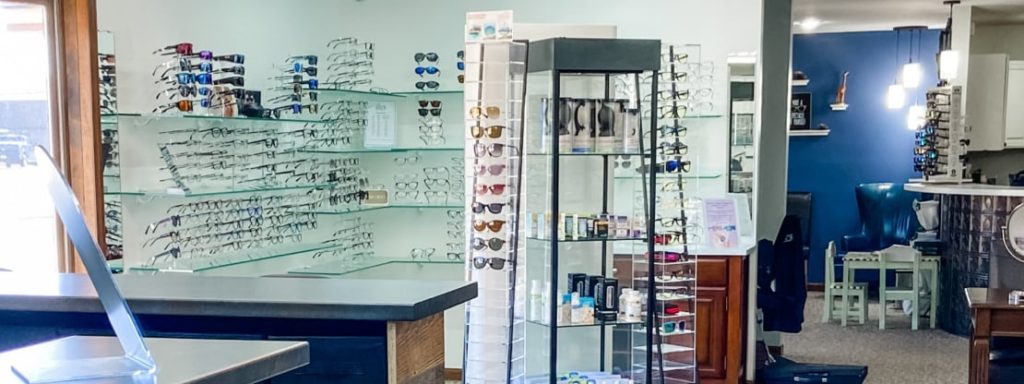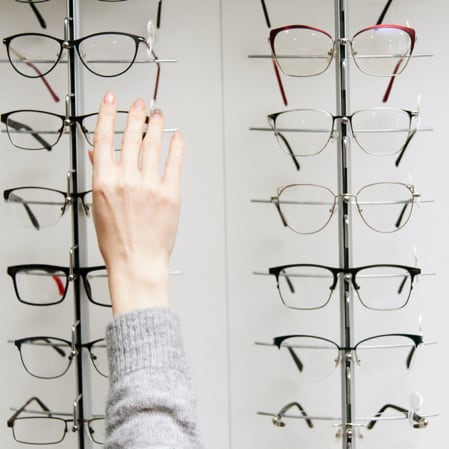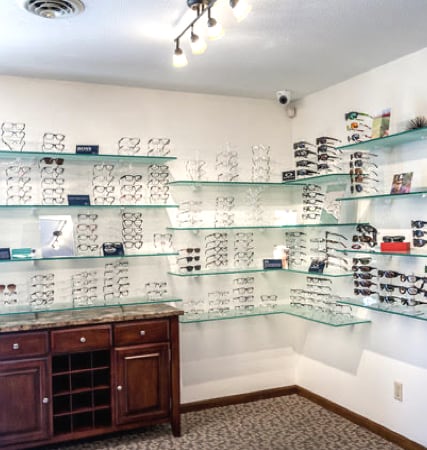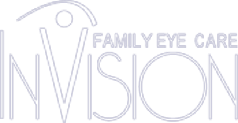Comprehensive Eye Health Support
How do you know you have an eye health problem? How do you start managing an eye disease or condition? Will your eye health problem lead to permanent vision loss?
You may have many questions about your eye health, but our team is here to help. InVision Family Eye Care has the tools, technology, and team you need to help you take charge of your eye health and manage your vision.
It all starts when you book an appointment. Book yours and get help preserving your vision today.
Managing Eye Disease Starts with an Eye Exam
Whether you’re looking to update your lens prescription or manage an eye disease, the first step is always an eye exam.
We design our eye exam process according to your needs, based on information we gather from your personal health history, family health history, and your current visual and eye health. From there, we tailor our approach to look for issues you might be at a higher risk of developing.
During your exam, we’ll look at structures like your retina, macula, optic disc, and crystalline lens to gain a clear understanding of your eyes and what we can do to support them. Depending on our discoveries, we may recommend prescription lenses, medications, or surgeries.


Common Eye Diseases & Conditions
Glaucoma
Glaucoma is a group of eye diseases that affects your optic nerve. High intraocular pressure (IOP) is often associated with glaucoma development, but not every type of glaucoma affects your IOP levels.
As it develops, you could lose peripheral vision, but it can eventually lead to complete blindness. We can detect glaucoma signs either by observing your optic disc or measuring your IOP levels with tonometry.
The 3 most common types of glaucoma include:
- Open-angle glaucoma, which is the most common.
- Angle-closure glaucoma, which can cause sudden emergency symptoms.
- Normal-tension glaucoma, which doesn’t affect your IOP levels.
Age-Related Macular Degeneration
Age-related macular degeneration (AMD) is one of the most common eye diseases adults 60 and older can develop. It affects the macula, the center-most part of your retina responsible for providing your central vision.
There are 2 types of AMD:
Diabetic Eye Disease
Diabetes can increase the risk of several eye diseases, but it is directly responsible for diabetic retinopathy and diabetic macular edema.
Diabetic retinopathy occurs when high blood sugar affects your retina’s blood vessels, causing them to swell and leak fluid into your retina. The fluids damage the retina, causing vision loss.
Diabetic macular edema can develop due to diabetic retinopathy and occurs when fluids accumulate in the macula, causing it to swell over time.
Cataracts
Cataracts are some of the most common eye conditions adults develop as they grow older, and it could lead to blindness if it is not treated.
Proteins in your crystalline lens break down as you age, which can cause the lens to develop a hazy, milky appearance that obstructs your vision. Glasses and contacts can help correct early cataract-related vision problems, but cataract surgery is the only way to treat the issue and restore your vision.
Learn More About Your Eye Health
How Do You Detect Eye Diseases & Conditions?
Our team utilizes several different diagnostic technologies to gain a clear view of your eye health during your eye exam. During your exam, we may use:
- Optical coherence tomography
- Fundus photography
- Tonometers (Reichert 7CR Auto, Tonopen, Icare, Goldmann applanation)
Can I Tell If I Have An Eye Disease?
Many eye diseases develop with no early symptoms. Without an eye exam, you may not be aware you have an eye disease until the issue permanently changes your vision.
Preserving your eyes from eye disease is one of the many reasons why we recommend having regular eye exams.
How Do You Treat These Issues?
Treating an eye disease or condition ultimately depends on the type of issue you have. We can recommend medications to help manage diabetic retinopathy and AMD, or we may recommend surgery to treat cataracts or reduce the effects of glaucoma.
Our team can help determine which treatment may be best for you when you come in for your eye exams.
Can Eye Diseases Be Cured?
Many eye diseases have no cure, and the damage they cause often cannot be reversed.
The best way to protect and preserve your vision is to make sure you’re having regular eye exams.
Contact Us Today
Your eye health is just as important as your vision quality. Find out how our team can help support your eyes by booking your next eye exam today.
View Our Location

Our Address
- 1211 Hauck Dr.
- Rolla, MO 65401
Contact Information
- Phone: 573-364-6300
- Fax: 573-341-5058
Our Hours
- Monday: 8:30 AM – 5:30 PM
- Tuesday: 8:30 AM – 5:30 PM
- Wednesday: 10:30 AM – 5:30 PM
- Thursday: 8:30 AM – 5:30 PM
- Friday: 8:30 AM – 1:00 PM
- Saturday: Closed
- Sunday: Closed
Our Brands




















